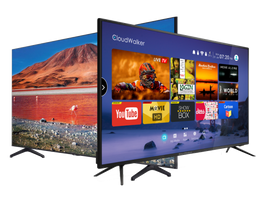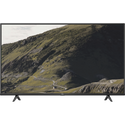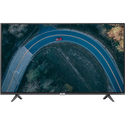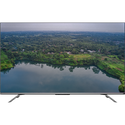A comparison of specs, key information, reviews, and best pricing from top retailers
Last updated -- hours ago | Report incorrect information
What we think

The PerfectRec TV team Learn more
Updated January 10, 2024·
The Samsung CU7000 (LCD) is a more budget-friendly option that will suffice for general TV watching and is significantly less expensive than the TCL Q6 (LCD). However, the TCL Q6 offers a better overall viewing experience, particularly for movies and gaming, due to its superior picture quality and color handling. If you have a bright room, the TCL Q6 also outperforms the Samsung CU7000 when it comes to handling reflections and maintaining image quality. When it comes to making a decision, consider whether the enhancement in picture quality and better handling of bright room conditions justify the higher cost of the TCL Q6 over the Samsung CU7000 for your specific needs. Give Feedback
this description is based on the product variant with some specs and product variant with some specs. At the time of writing, the variant with some specs cost some dollars and the variant with some specs cost some dollars.
Advantages of the Samsung CU7000 (LCD)
- Very good motion processing
Advantages of the TCL Q6 (LCD)
- Good for bright room
Key differences
Picture Quality
6.2


6.9
5.82/10
CONTRAST
5.64/10
5.6/10
COLOR VOLUME SCORE
7.5/10
LED
PANEL TYPE
LED
VA
PANEL SUB-TYPE
VA
The TCL Q6 (LCD) and Samsung CU7000 (LCD) both have only fair picture quality, though the TCL Q6 (LCD) has somewhat better picture quality.
Cartoons & Animation
5.7


6.6
5.9/10
COLOR GAMUT SCORE
7.3/10
5.6/10
COLOR VOLUME SCORE
7.5/10
6.2/10
SDR BRIGHTNESS SCORE
8.1/10
6.0/10
COLORS OUT OF THE BOX SCORE
5.8/10
6.0/10
GRAY UNIFORMITY
6.2/10
The TCL Q6 (LCD) is only fair for cartoons & animation, while the Samsung CU7000 (LCD) is poor.
The Samsung CU7000 performs poorly when watching cartoons & animation due to its fair colors out of the box and poor color gamut, which means it struggles to display a wide range of colors vividly. In contrast, the TCL Q6 is rated as fair in this category, which suggests it can produce more accurate colors straight away and has a good color gamut, allowing it to represent a broader spectrum of colors more effectively, though it still has room for improvement.
Bright Room
5.8


7.2
5.3/10
VIEWING ANGLE
5.4/10
6.2/10
SDR BRIGHTNESS SCORE
8.1/10
5.4/10
HDR BRIGHTNESS SCORE
7.6/10
5.9/10
REFLECTIONS SCORE
5.9/10
The TCL Q6 (LCD) is good for bright room, while the Samsung CU7000 (LCD) is poor.
The Samsung CU7000 struggles in bright rooms because it has only fair SDR brightness and poor handling of reflections, while the TCL Q6 is better suited for bright environments with its very good SDR brightness and good handling of reflections; however, both TVs have poor scores for HDR brightness.
Cost
$428


$700
$200
$400
$600
$800
$1,000
$1,200
The Samsung CU7000 (LCD) has a price of $428 and the TCL Q6 (LCD) costs $700.

Let Us Help Find Your Perfect TV
Find your new TV
Key similarities
Movies & TV
5.8


5.9
5.82/10
CONTRAST
5.64/10
6.6/10
BLACK UNIFORMITY
9.0/10
6.6/10
UPSCALING
6.3/10
Yes
HDR10 SUPPORT
Yes
Yes
HDR10+ SUPPORT
Yes
No
DOLBY VISION SUPPORT
Yes
The TCL Q6 (LCD) and Samsung CU7000 (LCD) are both poor for movies & TV.
The Samsung CU7000's poor performance with contrast, local dimming, and black uniformity results in a lackluster movie and cinematic TV watching experience, as deep blacks and high contrast ratios are essential for these types of content. Similarly, the TCL Q6's shortfalls in these same very important areas mean it also struggles to deliver a rich cinematic experience, additionally hampered by merely adequate performance in color accuracy and viewing angles.
Sports
6.6


6.2
8.0/10
MOTION PROCESSING
4.6/10
60Hz
REFRESH RATE
60Hz
8.7/10
INPUT LAG SCORE
10.0/10
6.6/10
UPSCALING
6.3/10
6.2/10
SDR BRIGHTNESS SCORE
8.1/10
Yes
HLG SUPPORT
Yes
The Samsung CU7000 (LCD) and TCL Q6 (LCD) are both only fair for sports.
The Samsung CU7000 and TCL Q6 both have their challenges when watching sports; the CU7000 handles motion better and is faster in responding to changing images, but it struggles with reflecting light and has a poor viewing angle, making it less ideal for groups spread out in a room. The TCL Q6, on the other hand, has similar issues with reflections and viewing angles, but also suffers from slower response times which might result in more motion blur during fast-paced games.
Gaming
6.0


5.8
6.5/10
RESPONSE TIME SCORE
6.4/10
8.7/10
INPUT LAG SCORE
10.0/10
8.0/10
MOTION PROCESSING
4.6/10
30.0/100
GAMING LOCAL DIMMING
19.0/100
5.9/10
GAME HDR BRIGHTNESS SCORE
8.1/10
Although they have very similar scores, PerfectRec considers Samsung CU7000 (LCD) to be only fair for gaming, while the TCL Q6 (LCD) is poor.
The Samsung CU7000 is better suited for gaming compared to the TCL Q6 because it offers very good input lag performance, ensuring quicker reactions to on-screen events. However, both TVs have similar fair response times, which means they can exhibit some blur during fast-moving scenes but the input lag difference makes the Samsung the more responsive option for gamers.
News, Talk, & Other TV
6.0


6.2
6.2/10
SDR BRIGHTNESS SCORE
8.1/10
6.6/10
UPSCALING
6.3/10
The TCL Q6 (LCD) and Samsung CU7000 (LCD) are both only fair for news, talk, & other TV.
The Samsung CU7000 has decent upscaling and fair SDR brightness, important for clarity when watching news or talk shows, but colors out of the box and color gamut are not impressive, affecting the vibrancy and accuracy of what's seen on screen. In contrast, the TCL Q6 exhibits very good SDR brightness which is optimal for viewing in well-lit rooms, and good color out of the box, ensuring a pleasant viewing experience without additional tweaking, albeit with weaker upscaling which might not render lower resolution content as clearly.
Give feedback
We’re constantly working to improve.
How the Samsung CU7000 (LCD) and the TCL Q6 (LCD) compare to other TVs
Spec Comparison
| Samsung CU7000 (LCD) | TCL Q6 (LCD) |
GENERAL | |||
|---|---|---|---|
| Price | |||
$428 | $700 | ||
Brand | |||
Brand | Samsung | TCL | |
Release Date | |||
Release Date | April 5, 2023 | July 1, 2023 | |
Full name | |||
Full name | UN65CU7000 | 65Q650G | |
Screen Size | |||
Screen Size | 65" | 65" | |
Screen Resolution | |||
Screen Resolution | 4K | 4K | |
TV FEATURES | |||
|---|---|---|---|
Operating System | |||
Operating System | Tizen | Google TV | |
Sound Quality Score | |||
Sound Quality Score | 5.9/10 | 6.4/10 | |
NextGen Ready | |||
NextGen Ready | No | No | |
HDMI Ports | |||
HDMI Ports | 3 | 3 | |
Coax Ports | |||
Coax Ports | 1 | 1 | |
DISPLAY QUALITY SCORES | |||
|---|---|---|---|
Picture Quality Score | |||
Picture Quality Score | 6.2/10 | 7/10 | |
Bright Room Score | |||
Bright Room Score | 5.8/10 | 7.2/10 | |
Gaming Score | |||
Gaming Score | 6/10 | 5.9/10 | |
Movies & TV Score | |||
Movies & TV Score | 5.9/10 | 6/10 | |
Sports Score | |||
Sports Score | 6.6/10 | 6.3/10 | |
PHYSICAL | |||
|---|---|---|---|
Dimensions w/o Stand (H x W x D) | |||
Dimensions w/o Stand (H x W x D) | 32.7" x 57.1" x 2.4" | 32.8" x 56.9" x 3.2" | |
Dimensions with Stand (H x W) | |||
Dimensions with Stand (H x W) | 35.7" x 57.1" | 34.6" x 56.9" | |
Weight without Stand | |||
Weight without Stand | 32.7 lbs | 33.7 lbs | |
VESA Mount | |||
VESA Mount | 400 x 300 | 300 x 300 | |
DISPLAY | |||
|---|---|---|---|
Color Depth | |||
Color Depth | 10 bit | 10 bit | |
Black Frame Insertion | |||
Black Frame Insertion | Yes | No | |
Auto Low Latency Mode | |||
Auto Low Latency Mode | Yes | Yes | |
Contrast | |||
Contrast | 5.8/10 | 5.6/10 | |
Local Dimming | |||
Local Dimming | 4.1/10 | 3.5/10 | |
SOUND | |||
|---|---|---|---|
Speaker Setup | |||
Speaker Setup | 2.0 | 2.0 | |
Speaker Power | |||
Speaker Power | 20 W | 20 W | |
Dolby Atmos | |||
Dolby Atmos | Yes | Yes | |
DTS:X | |||
DTS:X | No | No | |
Shopping
TCL Q6 (LCD)
See more
Dig into reviews and images
CNN Underscored
Michael Gowan | July 2023
"If you’re looking for a good overall viewing experience without spending a lot, the TCL Q6 fits the bill. With its good color reproduction, the image on the screen will do just fine, especially for HDR content."
Get a great deal on the Samsung CU7000 (LCD) or the TCL Q6 (LCD)
About Samsung
Samsung, a South Korean electronics manufacturer, holds the title of being the largest global TV vendor in terms of units sold. They offer a diverse lineup of TV products that cater to various budget ranges. A notable achievement in recent years is the development of Quantum Dots, a technology that enhances color reproduction, resulting in richer and more vibrant hues. Samsung TVs are well-regarded for their high manufacturing quality and user-friendly software, making them an excellent choice for consumers seeking an intuitive viewing experience.
About TCL
TCL, the highly recognizable TV brand from China, has firmly established itself as the second-largest manufacturer in terms of sales volume. Renowned for striking an impressive balance between affordability, picture quality, and design, TCL TVs deliver a compelling overall package. While they have traditionally excelled in the low-end and midrange TV segments, TCL has recently made remarkable strides in the realm of high-end televisions, introducing impressive models that rival top competitors. Most TCL TVs use Roku software which is very user friendly and easy to use, but they have a few other models that use Google TV which has the largest app selection, but is not as user friendly as Roku.
Give feedback
We're constantly perfecting our model
TV guides you might be interested in
More comparisons for you
FAQs
FAQs about TVs
Why trust us
This information was produced and vetted by the PerfectRec TVs team. We are a product research and recommendation organization that meticulously reviews and evaluates the latest TV information and makes it digestible for you.
By the numbers
385
TVs evaluated
33,110
TVs stats compiled
21
Proprietary TVs ratings developed
156,330
Recommendations made
23,450
Consumer hours saved
About the TV team
Joe Golden, Ph.D
CEO and TVs Editor
Joe is an entrepreneur and lifelong electronics enthusiast with a Ph.D in Economics from the University of Michigan.
Jason Lew
Staff Expert & Software Engineer
Jason is a staff expert and software engineer that has been making laptop recommendations for 7 years and moderates one of the largest laptop subreddits.
Chandradeep Chowdhury
Staff Expert & Software Engineer
Chandradeep is a staff expert and software engineer and expert in televisions and monitors. He’s been making monitor recommendations for ten years.
Jaime Roldán
TVs Expert
Jaime is a Colombia-based TV expert. He is an electronics engineer with 8 years of experience in the telecom sector and has been making TV recommendations for 12 years.















